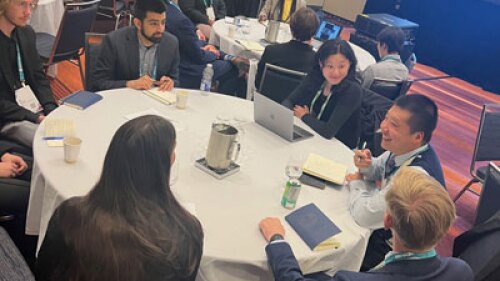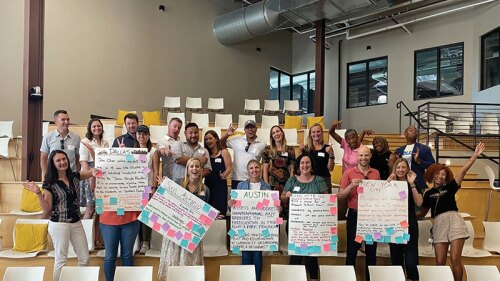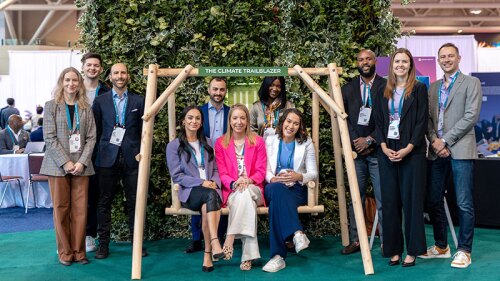“Advisory Services Spotlight” is a regular ULI Connect feature that provides a quick overview of a recent ULI Advisory Services panel, the land use challenge addressed by panelists, and recommendations made to the sponsor city or institution. This month, we feature a panel for the University of Denver held in June 2016. The full report and a summary are also available if you would like to learn more about the panel’s work.
The land use challenge. Located south of downtown Denver and a vital player in the local and regional economy, the University of Denver (DU) is Colorado’s oldest private institution of higher education and has a student enrollment of nearly 13,000. In June, DU asked a ULI Advisory Services panel for advice on how to open up the campus to the Greater Denver community—physically, socially, and economically—and transform it into a more inviting, vibrant, and engaged place.
The context. DU attracts students from around the country, the majority of whom remain in Colorado after graduation. It also offers several nationally ranked programs, including in the fields of business and international studies, and is a major employer in the region. According to feedback from more than 2,500 students, faculty, and community members solicited through a strategic planning process led by university chancellor Rebecca Chopp, the DU feels closed off and inaccessible. With its topnotch programs and state-of-the-art facilities, DU is known more as one of Denver’s “best-kept secrets” rather than as a hub for engagement, innovation, and transformative ideas—the new vision for the university set forth by “DU Impact 2025,” the recently approved strategic plan. Chopp and others sought ULI’s land use expertise to help DU develop a strategy to turn its vision for the campus into reality.
The assignment. The panel focused on four areas of inquiry:
- Placemaking strategies for activating the campus;
- Improved mobility both to and within the campus—through light rail, and bike and car sharing;
- Tools available to spur more economic development, such as special taxing districts and public/private partnerships; and
- Ideas for more meaningful community engagement to foster town/gown relations and elevate DU’s profile.
Recommendations. The ULI panel urged DU to be, above all, student- and people-focused. It recommended that DU foster closer ties with the city of Denver and expand community engagement through programming and events; consider working with the city and county to move the light-rail station closer to campus; change the DU mind-set to be open and inclusive; take advantage of retail and student housing development opportunities by working with the private sector; invite people to enjoy DU’s many green spaces and gardens to create a “community living room”; establish a campus gateway and smaller destinations within the campus through design and placemaking; and create an innovation hub that serves the entire Rocky Mountain region, marrying university ingenuity and resources with community needs.
Panel chair Glenda Hood: “DU is already an economic driver and engine for the city of Denver and the entire Rocky Mountain region. Our Advisory Services panel provided insights on how the university can take itself to the next level by leveraging proximity to Denver and becoming a more open, welcoming, and engaged neighbor. We strongly urged DU to embrace thinking differently in order to transform itself from an excellent but inward-facing campus into the go-to resource for ideas, innovation, engagement, and problem solving for the Greater Denver community. With chancellor Chopp at the helm and a new strategic plan in place, DU is poised to grow and develop not only as an academic institution, but to fully embrace its role as a community thought leader and facilitator for the region.”
Next steps. The ULI report has led DU to develop its first campus master plan in 40 years, says David Greenberg, DU vice chancellor for institutional partnerships. Several of the panel’s recommendations will inform the process, helping DU achieve several goals laid out in its strategic plan, including breaking down academic silos through a more interdisciplinary approach, making the student experience more personalized and meaningful, and strengthening relationships with Denver. The ULI panel offered “the perfect solution,” Greenberg says, for reaching a common understanding among stakeholders—students, faculty, community leaders, city planners, and elected officials—so that DU can reach its potential through changes to the built environment. “Without ULI, I don’t know how that would’ve happened,” he says.
Interesting in volunteering on a ULI Advisory Services panel? Learn more about ULI Advisory Services.




